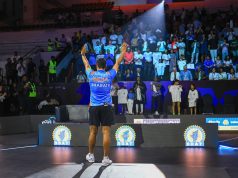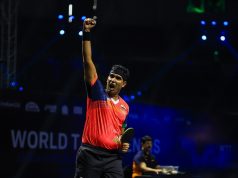Legendary Indian Football player and coach Pradip Kumar Banerjee, fondly known as P. K. Banerjee, died in Kolkata at the age of 83 due to multiple organ failure. One of the greatest footballers of India, PK represented the country in 84 matches scoring 65 goals. He was one of the greatest and longest serving coaches of India who was often called ‘Alex Ferguson of Indian Club Football’.
P.K.- Journey from Jalpaiguri to Kolkata and India
P.K. was born as Pradip Kumar Banerjee in Jalpaiguri of then Bengal Presidency in 1936. It was in pre-independent India that Banerjee started to play Football and excelled in an early age. Even as the country was going through a tumultuous time, the young boy stayed focussed on his job.
While in school, P.K. represented Bihar in Santosh Trophy and then after completing his schooling from K.M.P.M. School in Jamshedpur, he moved to Calcutta (erstwhile name of Kolkata), the Mecca of Indian Football.
Banerjee debuted in Kolkata Maidan in 1954 when he joined Aryan Club. His right wing moves became so impressive that he soon became the sought-after footballer. But P.K joined the less-fancied Eastern Railways and remained loyal to the club for 13 straight seasons.
P.K- A glorious career sans playing for the Kolkata giants
One of the highlights of his career is that, P.K is perhaps the only footballer in Kolkata who made a glorious career without playing for the three Kolkata giants. His team even won the Calcutta Football League in 1958, the only Calcutta League title that did not go to Mohun Bagan, East Bengal or Mohammedan Sporting.
Banerjee scored 190 goals for Eastern Railways and led Indian Railways to Santosh Trophy triumph thrice in 1961, 1964 and 1966 scoring 28 goals. Before that he won the Santosh Trophy thrice each for Bengal in 1955, 1958 and 1959.
Franco Fortunato, who played for Indian national team alongside P.K. Banerjee, remembered P.K. as “exceedingly quick, often clocking speeds like 11.3 or 11.4 kph effortlessly.” [Source: ESPN India]
P.K.- part of some of the greatest Football achievements in India
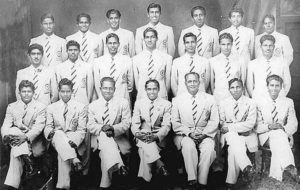
P.K. Banerjee made his international debut on December 18, 1955, against Ceylon (currently Sri Lanka) in the fourth Quadrangular Cup in Dhaka at the age of 19. He scored two goals on his debut as India rallied to win the match 4-3. He ended the tournament scoring five goals, the maximum for any Indian player on his debut International tournament.
In his India career spanning more than a decade, P.K. was part of some of the biggest achievements in Indian Football. In 1956 Melbourne Olympics, India became the first Asian country to reach the Olympics semi-final. In the quarter-final match, India beat the host Australia 4-2 with P.K assisting Neville DeSouza, who scored a hat-trick, and then J. Krishnaswamy.
The Indian Football legend captained India in the 1960 Olympics. Though it was not a good outing for team India as they finished fourth in a four-member group, but India played out an impressive 1-1 draw against France where P.K scored the equalizer.
While playing for the country, P.K. represented India on three occasions in the Merdeka Cup in Kuala Lumpur — where India won silver in 1959 and 1964 and the bronze in 1965.
But the pinnacle of his career was undoubtedly the Asiad triumph in 1962. India were defeated 2-0 by South Korea in the opening match but came back strongly in the second match to beat Thailand by 4-1 in which P.K. scored two goals. After their comprehensive victory against Japan, India was placed in the semi final to clash against South Vietnam.
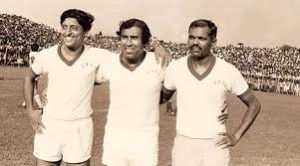
India, comprising of three greats- P.K. Banerjee, Chuni Goswami and Tulsidas Balaram– became a solid unit before the semi final match, thus defeating South Vietnam in a tough match but confidently. But in front of a hostile Jakarta crowd, in the final, they had to face South Korea again.
India coach Abdul Rahim depended much on the three doyens of Indian Football and all three delivered their best. But the final perhaps remains as P.K’s match as the legend opened the scoring in India’s win over the host by 2-1.
“I was a lucky captain that I had such brilliant players with me,” Chuni Goswami once said while remembering the win. [Source: ESPN India]
After his Merdeka Cup success, P.K could not prolong his career due to injuries and called off his career in 1967. “I had the privilege of being his teammate for two Olympics (1956 and 1960) and three Asian Games (including the gold-medal winning team in 1962). We can rarely see a more complete team man than PK who had amazing speed and ball control,” said Balaram, the member of the illustrious ‘troika’. [Source: ESPN India]
P.K.- One of the most successful Indian coaches
P.K. Banerjee took charge of the national team and under his coaching, India won bronze in Bangkok Asian Games in 1970. It was the last time India won a medal in Football at the Asian Games. He then went on to coach the national team in the 1974 Tehran Asian Games, 1982 New Delhi Asian Games and the 1986 Seoul Asian Games. He was also in charge as the coach in the Merdeka Cup in 1971, 1973, 1981, 1982 and 1986. Under him India became champion in the SAF Games in 1985 held in Dhaka.
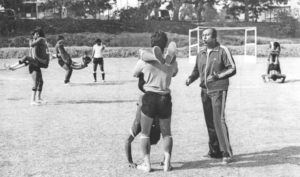 PK’s system of coaching focused heavily on wing-play as well as strong defensive midfield play. He was one of the most successful national coaches serving the team for 15 years, from 1972-1986. However, his success as a club coach is incomparable. The man started with short stints at Bata Sports Club and Eastern Railway before being appointed by East Bengal in 1972.
PK’s system of coaching focused heavily on wing-play as well as strong defensive midfield play. He was one of the most successful national coaches serving the team for 15 years, from 1972-1986. However, his success as a club coach is incomparable. The man started with short stints at Bata Sports Club and Eastern Railway before being appointed by East Bengal in 1972.
Banerjee built a strong defensive side in which he gave importance to not break the team formation under any circumstance. In 1972, East Bengal remained unbeaten while winning the Calcutta Football League, the IFA Shield, the Durand Cup, the Bordoloi Trophy and shared the Rovers Cup in Mumbai. In the entire season, the club conceded just four goals.
In 1973, East Bengal won the IFA Shield in Kolkata by defeating North Korean clubs Pyongyang City and Dok Ro Gang. The team also won the DCM Trophy in Delhi that year.
But for East Bengal fans, the sweetest memory of P.K.’s coaching is the team’s win against arch-rivals Mohun Bagan in a derby match in 1975 by 5-0. It was a huge win for the club and more satisfying as the opponents had Prasun Banerjee, P.K’s younger brother.
But P.K was not only successful for East Bengal as 23 trophies won by Mohun Bagan under his leadership increased his credibility as a successful manager. He won the treble (IFA Shield, Rovers Cup, Durand Cup) with Mohun Bagan in 1977.
P.K. Banerjee was famous for his pep talks before matches, famously known as ‘P.K. Vocal Tonic’. His man-managerial skill brought out the best in every player.
In 1977, P.K.Banerjee was the coach of Mohun Bagan that played against Cosmos Club from USA, a match where the legendary Pele had turned up for the New York-based side. The Indian club held the guest by 2-2 and Pele after the match pointed to P.K. to give the famous quote, “This man had prevented me from showing my skills to the audience of India.’
This great man died after prolonged illness on 20th March 2020. The journey of a little boy from pre-independent India who went on to win the FIFA Order of Merit, the highest honour awarded by FIFA, is highly engrossing. His death has created a void that is perhaps to remain unfulfilled.


